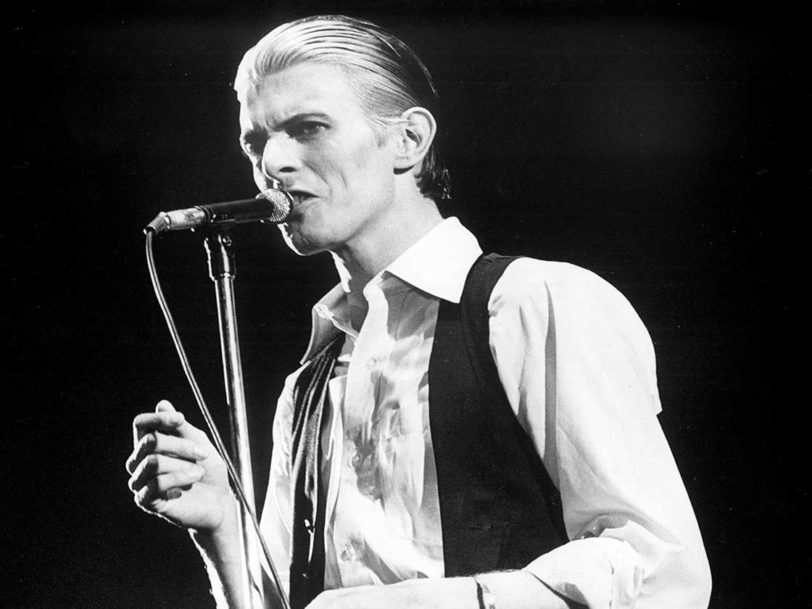David Bowie was ahead of his time in just about every sense of the term. He left us a singular catalogue of fantastic, future-shaping music, and his adopted personas, from Ziggy Stardust to Aladdin Sane and The Thin White Duke, remind us why he’s revered as rock’s ultimate master of reinvention. Yet even in his everyday life, Bowie looked otherworldly. He exuded an indefinable charisma and, of course, he had different coloured eyes – one clear blue and the other a moody shade of brown.
Why did David Bowie have different coloured eyes?
Bowie’s hypnotic dual-coloured eyes have long since been the source of speculation. Instead of accepting that he was born plain David Jones in Brixton, London, some would prefer to believe his eyes proved that he really was an alien from another planet, and that he actually crash-landed on Earth like another of his famous alter egos, Thomas Jerome Newton in Nicolas Roeg’s sci-fi classic, The Man Who Fell To Earth.
Others, who are a little more grounded, believe Bowie’s different coloured eyes were the result of heterochromia – an often hereditary condition in which a person has different iris colours. It’s usually harmless and is more common in cats, dogs and horses, though high-profile figures with heterochromia, such as actress Alice Eve and Australian cricket ace Shane Warne, demonstrate that it’s not unknown in humans either.
In reality, though, David Bowie had a condition known as anisocoria, which effectively meant that the pupils in his eyes were of different sizes – which made his irises appear to be of different colours, too. This condition can also be hereditary, but Bowie didn’t suffer from it until he was into his teenage years, and the reason it afflicted him was considerably more prosaic.
“I was very pissed off with him… At break time I hit him”
Throughout Bowie’s life, one of his best friends was George Underwood. As boys the pair went to school together, and their burgeoning interest in the opposite sex resulted in an unlikely confrontation in the spring of 1962 which would change Bowie’s appearance forever.
The object of the young men’s affections was a girl called Carol Goldsmith, but things quickly went awry when they both made a play for her around the time of Underwood’s 15th birthday. Underwood recalled that he had organised a date with Carol, only for Bowie to call and tell Underwood that she was going out with him instead.
“I was very pissed off with him,” Underwood said in an interview with The Telegraph. “And in the morning I got on the bus to school and overheard him talking about this girl he was going out with. At break time I hit him.”
Though Underwood was aggrieved with his good friend, he hadn’t intended to leave lasting damage. Underwood’s punch was so forceful, however, it left Bowie with aniscoria – and a permanently dilated pupil. The upside was that the condition afforded Bowie a strange, extraterrestrial look which added to the young star’s mystique as he embarked on his long journey to stardom.
“it gave him that enigmatic look”
Happily, the two young men quickly patched up their temporary falling out and remained thick as thieves from thereon in. During 1963, Underwood joined the Beckenham Art School and – like Bowie – he became increasingly interested in music. He made a record with The King Bees and also – under the pseudonym Calvin James – a solo single, Some Things You Never Get Used To, before returning to his art studies and then embarking on a successful career as an illustrator.
As a freelance artist, Underwood went on to design two critically acclaimed David Bowie album covers (Hunky Dory and The Rise And Fall Of Ziggy Stardust And The Spiders From Mars), along with other memorable artworks such as T. Rex’s Futuristic Dragon and The Fixx’s Reach The Beach. He has since created hundreds of book and CD covers, along with commissions for adverts and portraits. Indeed, original George Underwood paintings are now highly regarded by private art collectors, and the artist could count his old school friend among those who purchased his work throughout the decades.
“George has, over the years, refined his work to the point where I would put him among the top figurative painters coming out of the UK right now,” Bowie said in a statement on Underwood’s website. “There’s a sublime isolation surrounding his subjects that really touches the viewer – the figures being both heroic and vulnerable simultaneously.”
“David said I did him a favour”
Ultimately, then, it seems that the two talented young men benefitted from one brief moment of hot-headed teenage angst which left such a lasting impression. Surviving that momentary punch-up, their friendship went on to last a lifetime, with Bowie even sending Underwood a hamper on his birthday each year.
“I only ever meant to give him a black eye at most,” Underwood said, reflecting on the life-changing incident in a 2016 BBC interview. “But later David said I did him a favour. After all, everyone talks about his eyes, don’t they? It did give him that really enigmatic look.”




